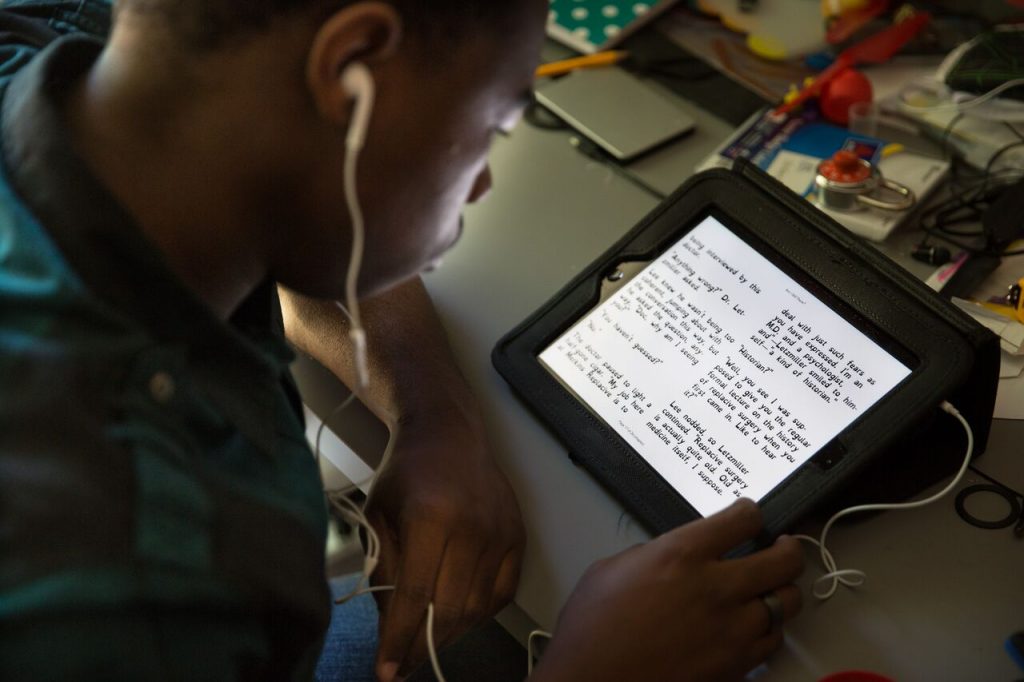The Internet Archive is bringing more periodicals and scholarly resources to students directly and by working with disability offices in the United States, Canada and elsewhere.

As more students with disabilities pursue higher education, demand is growing for books, journal articles and other learning materials to be available in accessible formats. This includes digitizing print materials for people who are blind or have low vision, those with dyslexia or attention deficit/hyperactivity disorder (ADHD), and people with limited mobility who might have difficulty holding print documents.
The Internet Archive is part of an expanding effort to make it easier for people with print disabilities to access information by digitizing books, periodicals, and microfilm needed to succeed in school and beyond. Once print materials are converted to machine-readable formats, users can listen with a screenreader, text-to-speech software or other forms of audio delivery—starting, stopping, and slowing down the information flow, as well as change the colors of text and background of pages.
With 10 percent or more of students at colleges in the United States requesting accessibility accommodations (Government Accountability Office, 2009, p.37), providing digitized learning materials is critical. Each semester Disability Service Offices (DSOs) on campuses respond to student requests to convert materials into accessible formats—often doing so in silos with limited budgets.
Libraries are being called into action to coordinate the delivery of accessible instructional materials. Doing its part to improve access to knowledge for all, Internet Archive is collaborating with others to share its collection and streamline the search process.
A level playing field
“There is a need for a fast turnaround with materials. Students [with print disabilities] need a level playing field,” said John Unsworth, dean of libraries at the University of Virginia. “The library is not just here for the able-bodied.”
UVA is working with the Internet Archive, BookShare, and the HathiTrust to reduce duplication of efforts across the country to convert text materials to accessible formats. Together, they are participating in the Federating Repositories of Accessible Materials for Higher Education (FRAME) project funded with a $1 million grant from The Andrew W. Mellon Foundation.
Since 2019, the partners have established Educational Materials Made Accessible (EMMA), a hub and repository for digitized materials. The pilot includes six other universities: George Mason University, University of Virginia, Texas A&M University, University of Illinois at Urbana-Champaign, University of Northern Arizona, University of Wisconsin-Madison and Vanderbilt University.
“When looking at the intersection between copyright and civil rights…civil rights win every time”
– John Unsworth, university librarian, University of Virginia
EMMA provides DSO staff (on behalf of students) with a central place to retrieve—and library staff re-deposit—machine-readable texts from the Internet Archive, HathiTrust, and Bookshare. It provides a searchable database to locate materials requested by students more efficiently. Users can filter by repository, format and accessibility features—which will become more valuable as texts are remediated. The project relies on the Internet Archive as a large digital repository to provide a federated network of storage and delivery, as well as technical expertise.
Unsworth said the goal of EMMA is to speed up access to materials and help DSOs avoid duplication. If faculty tinker with a syllabus and add a book at the last minute, students with print disabilities need to be able to have a copy they can use at the same time their peers do. “It’s the nature of education that what you need to read changes during the semester,” Unsworth said. “[Students with print disabilities] can’t get materials at the last minute when everyone else has had it for two weeks.”

Often, libraries are not involved in collecting, cataloguing, or preserving educational materials for people with disabilities on their own campus, or making them discoverable to others. EMMA is designed to connect DSOs and libraries on the same campus — and with other institutions. Once materials are remediated, DSOs put them in a drop box that the library validates with the new metadata and uploads it. “Libraries shoulder the burden of sharing—and by doing that, they help fulfill their mission,” Unsworth said.
Despite publisher warnings about what DSOs can do with their remediated content, Unsworth said concerns are not supported by law. “When looking at the intersection between copyright and civil rights…civil rights win every time,” Unsworth said. “Libraries are used to pushing back on publisher claims. Libraries bring a willingness to stand up to appropriate use rights.”
A coordinating hub for materials was desperately needed and, Unsworth said, something DSOs have been waiting to have for years.
“Everyone should have the same shot at succeeding”
– Angella Anderson, disability specialist, University of Illinois at Urbana-Champaign
Based on a student’s syllabus, Angella Anderson, a disability specialist at the University of Illinois at Urbana-Champaign, arranges for needed accessible materials for students at all levels—from undergraduates to law students to doctoral students. “We have several students who—without this service—would have had significant challenges being successful in their programs.”
Now, with EMMA, if a book or journal article a student needs is already shared on the hub, the DSO can download it and save time. Anderson estimates it has cut her time searching for learning materials by half. “The problem we’ve all had over the years is that we are converting the same book at the same time. That’s a huge resource drain,” Anderson said, noting the potential benefit of EMMA. “Everyone should have the same shot at succeeding at whatever it is they want to do, so I feel this will be extremely useful to a lot of schools and a lot of students.”
Canadian efforts advance
In Canada, the Internet Archive supports work of the Accessible Content E-Portal (ACE), a service of the Ontario Council of University Libraries. At the Internet Archive digitization center at the University of Toronto, staff digitize on demand and prioritize requests received by ACE from students who need materials for accessibility. The turnaround used to take weeks, but Andrea Mills, digitization program manager, said the system has been improved and students with print disabilities now can get materials digitized often in less than two days.
Mills said requested materials most often include non-fiction research books and novels, often printed between 1990 and 2010—before e-books were widely available. Elsewhere in Canada at the University of Alberta, another Internet Archive scanning center provides the same service, through their Accessibility Resources office, to students who have qualifying perceptual challenges..
“Sometimes people not part of the mainstream are forgotten,” Mills said. “It may only be a handful of users who have this need, and not represent a high number of downloads or uses, but these are people who truly need assistance.”
Learn more
Librarians: Join our free program to qualify your patrons to access the Internet Archive’s resources for users with print disabilities. Individuals can gain access by having a qualifying authority like the Vermont Mutual Aid Society enroll you in their program.


